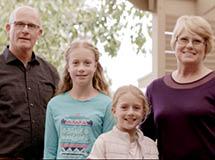
Thinking about fostering? Learn more below or call 1300 2 FOSTER (367 837) for more information. You can also contact non-government foster care agencies directly
We need all kinds of foster carers – from emergency carers who can take children at short notice to those who can provide a home for children until they turn 18. Whether it’s a weekend, a week in the school holidays, a fortnight, a month or longer, any amount of your time could really make a difference.
Foster carers are generally aged between 25 and 70 and can be:
- individuals (male or female)
- couples (including same sex couples)
- people with their own children
- people who do not have children.







